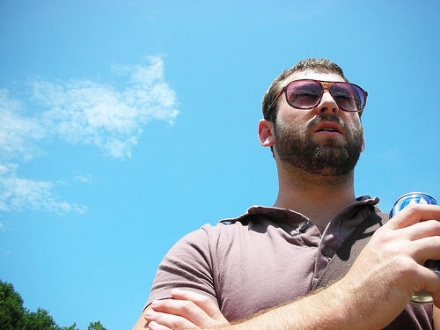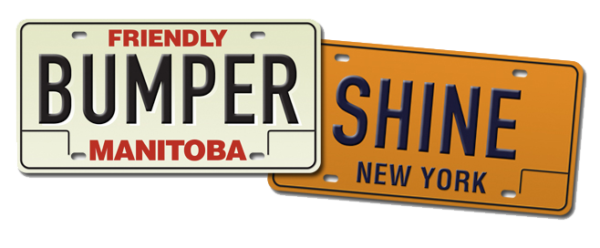I recently had the chance to conduct an email interview with premium dancer, blogger, party promoter and DJ extraordinaire, David Bruno (Slap You In Public). David will be taking time out from his busy DJ and dance party schedule to spin some discs at the After The Jump Fest on August 25th, 2007.

My name is David and my brother’s name is Bruno. Did you have any older brothers or sisters that influenced your musical tastes?
DB: I’m actually the oldest in my family. I really can’t say what got me so obessesed with music. When I was younger I used to make mix tapes and fake radio shows. I’m not ashamed to say two of my first cassette tapes were Black Box and C&C Music Factory.
Are you primarily influenced by other DJ’s or just by listening to different types of music? How would you describe your style?
DB: I’m definitely influenced by every DJ that I hear. I spent some time interning for Josh Wink’s record label Ovum Recordings while I was in school in Philadelphia and his dramatic technical style definitely rubbed off on me. I love to make people dance while exposing them to new crazy music. It truly depends on the club, the time I play, and the vibe I’m getting from the crowd on what my next track will be. I’m definitely most excited about the new disco influenced music that is coming out of New York and Paris at the moment. In NYC, it’s being championed by the Rong Music crew, Wurst Edits, and of course Tim Sweeney and DFA. While I was in Paris, I heard some crazy new music coming from Cosmo Vitelli as Bo’Tox which will be out on DFA soon and the D*I*R*T*Y Edits crew. I’m really excited to be bring the D*I*R*T*Y boys to our next People Don’t Dance No More party on September 7th at 200 Orchard.
Is there any truth to the commonly held belief that it is illegal to dance in New York city nightclubs? As a follow up, what are some your favorite dance clubs in NYC?
DB: It is truly illegal to dance in many bars in NYC. You have to have a “Cabaret License” for your bar or club to allow “dancing.” It’s an outdated concept that stems largely from racial tensions in days gone by and now used as a zoning tool for neighborhoods. I really believe that it’s the reason that the club scene in New York is so divisive. A killer new club cannot open up at random in just any neighborhood as they can in London, or even Chicago. That being said, Studio B is really an amazing phenomenon of excellent music programming that has made it the best place to get down to great new music in NYC. It’s no Fabric, but it has been a much needed injection to the New York dance music scene.
Do you think New Yorkers are dancing more or less these days than before?
DB: New Yorkers dance. People have been coming from all over the country and the world for almost a century to make New York their home because of the music scenes that they are part of or follow. I think electronic dance music is gaining in popularity in New York largely because of the quality and rocky influence of the new music that has coming out recently.
What came first, Slap You In Public the website, or David Bruno the DJ?
DB: I got my turntables when I was 16. I literally sold my guitars and bought turntables. I never looked back. Slap You in Public started when a group of my friends got sick of my constant emails reminding them to buy tickets and listen to new bands about a year and half ago. It really is pretty much a soundboard for what I’m thinking about, listening to, and shows and clubs I’m pysched to go to.
DJ’s have always been some of the last champions of music on vinyl, is that still the case, or has everyone switched to mp3’s? What are the advantages and disadvantages of both mediums?
DB: I recently made the switch to Serato from vinyl mainly because it allows me to play new music immediately, rather than waiting to be able to buy it or get sent a copy on vinyl. Serato allows the DJ to manipulate MP3s just as they can a vinyl record using specially coded records. While I was working for Josh Wink he beta tested Final Scratch, the predecessor to Serato. I was reluctant to jump on that technology mainly because, at the time, it involved importing all of your music to your hard drive. It’s obviously not like that anymore. It’s completely realistic to get sent a track via email while you are in a club and play it immediately.
How is being a DJ today different from when you started?
DB: When I first started DJing you were limited by the records you could buy at your local record store. Now everyone with access to the internet can get almost any track ever produced. Not to mention there are now computer programs available that mix tracks together seemlessly with the touch of a button. It has taken some of the skill, mystique, and cache out of being a disc jockey.
You write a regular column for BrooklynVegan.com on the dance scene. How did that come about?
DB: I actually DJ’d a party for the site during CMJ last year and we hit it off. I hope people have found it a useful tool to discover the wonderful world of dance music.
Do you have anything special planned for the ATJF?
DB: Making people freak out to some crazy beats that may or may not involve Daft Punk.
Thanks for your time David. Looking forward to seeing you at the After The Jump Fest on August 25th!
David Bruno is a New York City DJ who runs the website SlapYouInPublic.com. He does not work for an executive search firm in Phoenix, as far as you know.
